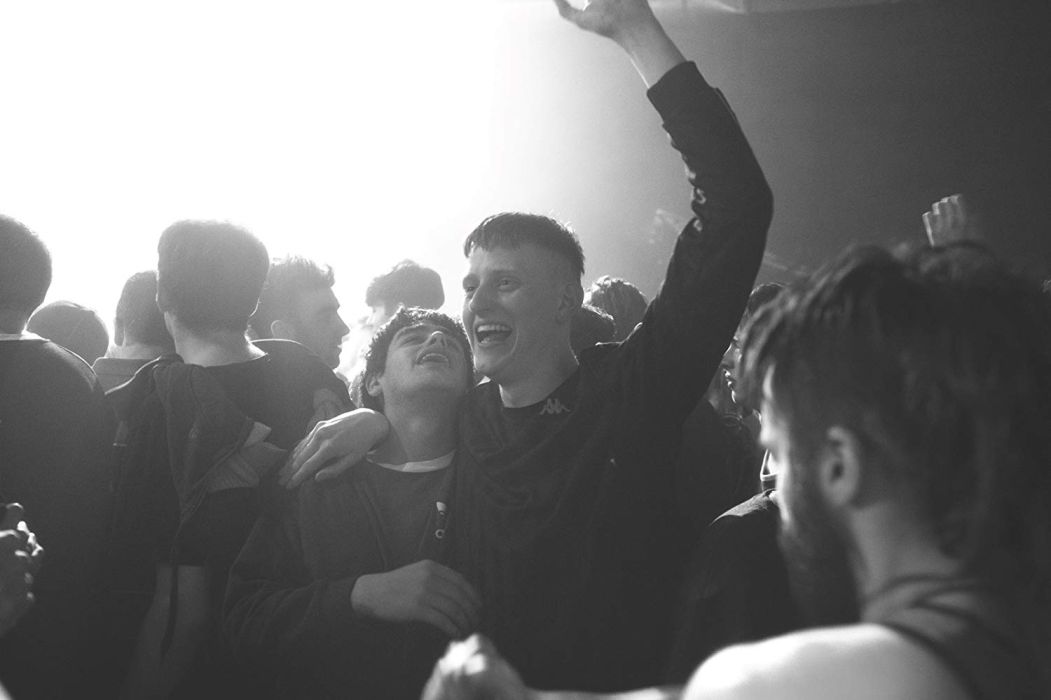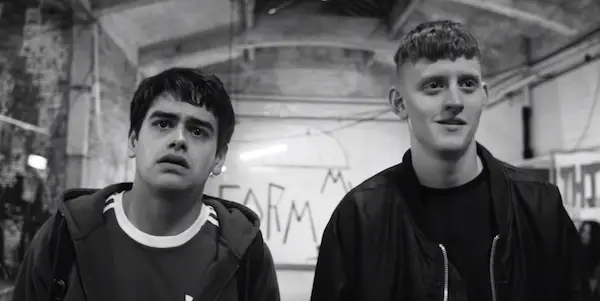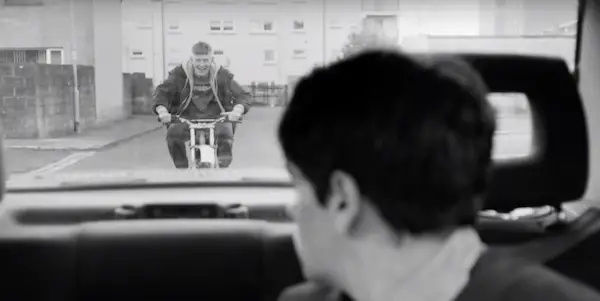BEATS: Captures The Spirit Of A Friendship & The State Of A Nation

Jim (Twitter: @JimGR) has written about film since 2010, and…
It’s hard to avoid comparisons between Brian Welsh‘s Beats and a touchstone of Scotland’s depiction in modern cinema: Danny Boyle‘s Trainspotting. Both are set in a slightly downbeat mid-1990s Scotland, featuring drug-taking and dance music from the fringes of Scottish society. However, Beats admirably carves its own path to be both a keen evocation of time and place, and a product of here and now.
The film, based on a stage play by Kieran Hurley (also on screenwriting duties), follows two school friends, Johnno and Spanner. Johnno hails from a family with middle-class aspirations – his step-father is a police officer, and they have found a shiny new-build home they are looking to move to. His best friend is Spanner, a live wire with a more deprived home life – no parents present and a drug-dealing and abusive older brother.
The film is set against the backdrop of the UK government’s passage of the Criminal Justice and Public Order Act 1994, which – as is often repeated by the characters – outlawed gatherings with music “characterised by the emission of a succession of repetitive beats”. Chasing a wild night at an illegal rave, the stage is set for a meaningful night underscored by the bittersweet progression of the boys’ friendship.
Portrait of a friendship
The beating heart of the film is the relationship between Johnno and Spanner, and actors Cristian Ortega and Lorn Macdonald inhabit their characters with authenticity and spar with chemistry. Macdonald, in particular, is an animated presence delivering lines with a wit and speed that is infectious. Although it’s made clear he doesn’t always make the best decisions, the writing and acting behind his character mean our sympathies are always quite firmly grounded.
Ortega‘s Johnno is a more necessarily restrained presence, a classic straight man whose gormless face Welsh will often rest his frame upon. However, when the narrative begins to pull on the tensions inherent in their divergent home circumstances, his ability to convey frustration at his friend’s gung-ho approach to life and the more sketchy circumstances he is dragged into as a result is communicated without being histrionic. The path of their friendship is laid out, setting up the central rave as perhaps their final hurrah.

The supporting cast across the board add some further colour to the humour and also the film’s depiction of the boys’ family lives and the rave scene. Neil Leiper as Spanner’s brother, Fido, portrays some expert shitbaggery without being too caricatured. Ross Mann steals many scenes with the chemically-induced philosophy of pirate radio DJ D-Man. Fellow rave-goers Wendy (Rachel Jackson), Alison (Laura Fraser), and Laura (Gemma McElhinney) provide much needed foils as the film progresses. All these characters narratively prod the central two characters in revealing ways, and also serve to put the boys’ gas at a peep, to use a Scottish phrase, in ways that vary the character interactions.
The chemistry, warmth and humour between the central two means we gently mourn the inevitable drift of that friendship in the film’s coda. However, the progression of what drives them to attend the rave calmly lays out that inevitability.
Portrait of a nation
There is a commentary aspect to the diverging home circumstances of Johnno and Spanner, as well as precisely what the film uses to cement the time and place of the film. Tony Blair is featured at regular intervals in the opening stages of the film, shots lingering on TV broadcasts of him in his 1994 pre-Prime Ministerial form – the coming New Labour messiah and reformer of the Labour Party. He underscores scenes with talk of needing to “build a nation with pride in itself”, with the manner in which Blair is regarded and the path of the UK, and Scotland more specifically, now lending an historical irony.
The clear break in the central friendship is coming from Johnno’s move to a shiny, but anonymous, new-build housing estate far from the ‘troubles’ presented by Spanner and his ilk. Using homes to provide this contrast in societal fortunes has been seen before in portrayals of Scotland, most notably in a short scene in Lynne Ramsay‘s Ratcatcher, but Beats places its focus upon the institutional response to the rave scene.

The film certainly lags once the anticipated rave begins. As artfully done as it is, that segment will perhaps be more meaningful to those who were plugged in to the culture. The imagery that flashes during the hallucinogenic elements features the coming modernity forced upon Scottish industry, and when combined with all the other political mood notes highlights the growing inequality in Scotland at the time.
The enforcement of the anti-rave legal bill by local police serves to underline the bittersweet note the film finishes on. It is no coincidence it chooses to highlight the bill “was unopposed by both major parties” in the UK parliament. The story of the film is used to make us ask whether much has really changed in the intervening time, but, in the camaraderie shown between these diverging characters, offers a more optimistic note than the likes of Trainspotting.
Beats: Anything but ‘a succession of repetitive beats’
The film isn’t perfect, relying upon Fido to give peril during the rave when arguably little ends up being needed. The hallucinogenic imagery lingers too long, and with some interior dialogue scenes the film belies its stage roots. However, the cast is engaging, Welsh’s visual style is lively without falling into nightclub-style movie shot cliches, and as enjoyable as rave fans will find the music there is plenty meat on the bones of everything else.
Beats is a lively and thoughtful film, and not one that is characterised by a succession of repetitive beats.
Do you agree that Beats was engaging and heartfelt? Were you a part of the rave scene it depicts?
https://youtu.be/0o2xteiJt94
Does content like this matter to you?
Become a Member and support film journalism. Unlock access to all of Film Inquiry`s great articles. Join a community of like-minded readers who are passionate about cinema - get access to our private members Network, give back to independent filmmakers, and more.
Jim (Twitter: @JimGR) has written about film since 2010, and is a co-founder of TAKE ONE Magazine. His written bylines beyond TAKE ONE and Film Inquiry include Little White Lies, Cultured Vultures and Vague Visages. From 2011-2014 he was a regular co-host of Cambridge 105FM's film review show. Since moving back to Edinburgh he is a regular review and debate contributor on EH-FM radio's Cinetopia film show. He has worked on the submissions panel at Cambridge Film Festival and Edinburgh Short Film Festival, hosted Q&As there and at Edinburgh's Africa In Motion, and is a former Deputy Director of Cambridge African Film Festival. He is Scottish, which you would easily guess from his accent.













